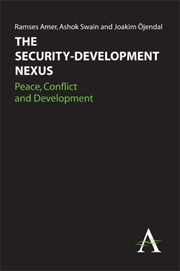Book contents
- Frontmatter
- Contents
- List of Tables and Figures
- List of Editors and Contributors
- Acknowledgements
- Chapter 1 Researching the Security-Development Nexus through a Multi-disciplinary Approach
- Chapter 2 Exploring the Security-Development Nexus
- Chapter 3 Liberal State-Building and Environmental Security: The International Community between Trade-Off and Carelessness
- Chapter 4 The Rising China and Maintaining the International Order: Some Reflections
- Chapter 5 Non-use of Force, Non-interference and Security: The Case of Pacific Asia
- Chapter 6 International Dimensions of Peace Processes in Aceh and Sri Lanka: The Role of Intermediaries in the 2000s
- Chapter 7 The Challenges of Human Security and Development in Central Asia
- Chapter 8 Diasporas' Role in Peacebuilding: The Case of the Vietnamese-Swedish Diaspora
- Chapter 9 Tracing Minerals, Creating Peace: The Security-Development Nexus in the DRC
- Chapter 10 Water Management and the Security-Development Nexus: The Governing of Life in eThekwini Municipality, South Africa
Chapter 7 - The Challenges of Human Security and Development in Central Asia
Published online by Cambridge University Press: 05 June 2012
- Frontmatter
- Contents
- List of Tables and Figures
- List of Editors and Contributors
- Acknowledgements
- Chapter 1 Researching the Security-Development Nexus through a Multi-disciplinary Approach
- Chapter 2 Exploring the Security-Development Nexus
- Chapter 3 Liberal State-Building and Environmental Security: The International Community between Trade-Off and Carelessness
- Chapter 4 The Rising China and Maintaining the International Order: Some Reflections
- Chapter 5 Non-use of Force, Non-interference and Security: The Case of Pacific Asia
- Chapter 6 International Dimensions of Peace Processes in Aceh and Sri Lanka: The Role of Intermediaries in the 2000s
- Chapter 7 The Challenges of Human Security and Development in Central Asia
- Chapter 8 Diasporas' Role in Peacebuilding: The Case of the Vietnamese-Swedish Diaspora
- Chapter 9 Tracing Minerals, Creating Peace: The Security-Development Nexus in the DRC
- Chapter 10 Water Management and the Security-Development Nexus: The Governing of Life in eThekwini Municipality, South Africa
Summary
Introduction
For almost two decades, academic and expert milieus have developed a broad definition of security, one that is distinct from the traditional, state-centric view that focuses on military issues. This definition encompasses so-called non-traditional security issues: weak states and economies, unresolved conflicts, growing poverty, migration, organized crime, drug trafficking, and corruption, as well as terrorism, insurrectionist movements, energy security, nuclear proliferation and nuclear terrorism, chemical and biological weapons, maritime security, cyber crime, environmental degradation, health (pandemics), and food security – all of which reveal forms of low-intensity conflict and failures in governance (Preventing the Next Wave of Conflict 2003).
Research is now moving beyond the study of isolated and specific elements of security studies in order to provide a greater theoretical understanding of the complex interaction between security issues and, rather than simply point to local variables, examine their causal mechanisms (King and Murray 2001–2). Human security challenges are indeed interconnected and transnational in scope, defying unilateral remedies and requiring comprehensive – political, economic and social – responses (Tadjbakhsh and Chenoy 2006). As a result, they cannot be separately studied, nor individually resolved. The need to shift from a state-based to a people-based approach is still being debated (Paris 2001; Thomas 2001). The importance of human factors in these various issues has indeed to be taken into account, especially when it comes to finding resolutions, but the state remains the principle framework for regulating individuals (Richmond 2007).
- Type
- Chapter
- Information
- The Security-Development NexusPeace, Conflict and Development, pp. 137 - 160Publisher: Anthem PressPrint publication year: 2012
- 3
- Cited by

